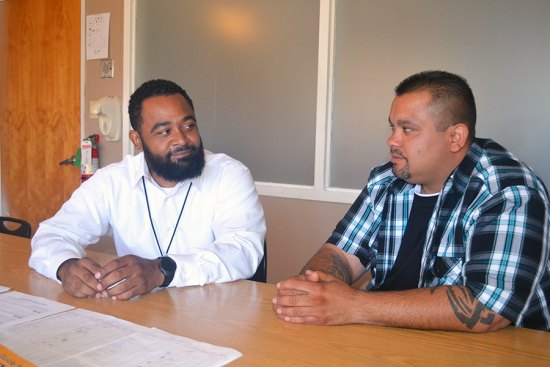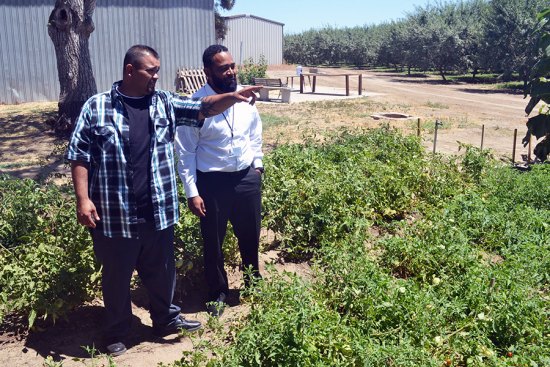Compassion and hope abound in Kings County. Local agencies, law enforcement offer help

The Kings County Jail has its share of these miscreants, perpetrators of misdemeanors and felonies. But for many lawbreakers, those who are more victims than criminals, there is compassion, and plenty of it, even in a community that cherishes the rule of law.
Enter Champions, a local non-profit treatment agency that offers the downtrodden - those in need of mental health and substance abuse services - an opportunity for redemption. Champions is a beacon of compassion, and it has garnered the support of local law enforcement, health agencies, businesses, and most importantly, the judicial system.
The compassion often originates from the highest levels of law enforcement and from local organizations that recognize that there are honest, hard-working people, unfortunately, caught up in the shadows, whose crimes, while real, are the result of their human frailties. The offense could be an unfortunate addiction to forbidden substances which unfortunately its victim has spiraled out of control.
“We really are the people’s providers, so we do what is needed in our community, whether that be linking somebody to a service we have or linking them to a service of a partner agency,” said Champions' executive director, Crystal Hernandez. “We’ve become very rooted in the various communities in Kings County and even in our neighboring counties.”

Hernandez, reflecting on Champions' role from the confines of her Douty Street office, across the street from the Hanford Courthouse, told The Leader that the organization has been in Kings County for 18 years. “It originally started because there was a need for youth programs,” she recalled. “That’s essentially what started it, and it was also to give you something positive to do in your lives and connect them with positive people.”
Since then, Champions has blossomed into the all-encompassing organization it is today. “Wherever the need is we go. Our folks like to be community-minded because it helps them feel what it means to be positive."
Champions is a mecca of inherently good people in positions of responsibility who can provide a chance at redemption for those who have somehow stumbled in life. But the local organization gets plenty of help from other organizations, from the courts and law enforcement agencies to the Kings County Probation Department.
“Our primary goal is to keep the community safe,” said Deputy Chief Probation Officer Adult Services Dan Luttrell who refers offenders to programs like Champions. “Not everybody … can be locked up, nor would we want everybody locked up,” he said.
Luttrell said that about 85 percent of persons convicted of a crime are placed on probation and offered programs and services – like Champions – to help them in their return to the community.
“We’re the ones responsible for reporting to the court how folks are doing.” He said most offenders would eventually end up back in the community. There are approximately 4,000 persons currently on probation in Kings County.
“We’re really happy with our partnership with Champions. We work very well together with many agencies,” insisted Luttrell. “Champions plays a huge role, and what’s great about Kings County is that if there’s an issue we need to address we’re able to get decision makers together in the room and make decisions.”
Luttrell added that any successes they have are a product of all the county partners, local law enforcement agencies working together to help folks from all walks of life become valuable community members.
One of those persons is 35-year-old John Lozano. His troubles began early. The young man often found himself alone, cared for by a single mom, working long hours to keep food on the table for her family which included Lozano and his brothers.
“I started taking drugs when I was 12 years old,” remembered Lozano. At the time it was just a taste, he recalled. He didn't end up a 12-year-old addict, but that early experience, unfortunately, led to a lifetime of addiction, recovery, and then more addiction.
“My older brother was out running around, doing his thing, and of course (he) was like a father figure in my life. He had the wrong crowd hanging (around him). Unfortunately, one of his friends offered it (meth) to me when he wasn’t around.”
Lozano said that when his brother found out, his sibling and friend got into a fight and ended their friendship. His brother has been in and out of prison. Another younger brother is currently serving ten years for assault and battery.
“I’m the only one (in his family) who hasn’t been to prison. I’ve done county time, and (then) there’s my baby brother who’s never been in any trouble because we definitely kept him away from all that. He says he’s learned from our mistakes.
“My brother wanted to try and keep me from that. He wanted to keep me from the life he was living. He did everything he could to try and keep me from it. But living in that small community on the south side is kind of hard because it was all the same people, and I just grew up way too fast. I didn’t get to be a child, you know. I wanted to follow in my brother’s footsteps. But he kept me from everything. When I wanted to go to a party, he would say no. I’d end up showing up on my own.
“It was just the community we lived in and the choices we made, and the friends we would hang out with,” lamented Lozano, clearly struggling with his emotions as he continued his narrative. “They offered it to you when you were young, and you wanted to be cool like the older guys. That was for me. Personally, I wanted to be like the older guys, because I always grew up with nothing but older people.”
The young Lozano was eager to tell his story, a tale that no youngster should have to experience, but far too many do. His older brother, while protecting his younger sibling from drugs, used drugs himself. “He tried to keep me away from that as much as possible. He never condoned it, and he never contributed it to me.”
Life has not been a “box of chocolates” for the well-meaning Lozano, now clean of drugs. He’s sitting in a large room surrounded by computers in Samuel’s House, a substance abuse recovery facility operated by Champions where he’s been rehabilitating, exorcising the chemical demons from his bloodstream.
He’s there because a judge decided a rehabilitation program was better than jail. Lozano attended Corcoran High School and Tulare Tech Prep Continuation School but didn’t graduate. He lived in Lemoore for a while and has five children.
“I’m in here originally for possession of a stolen vehicle,” he said. He was pulled over with 39 grams of methamphetamines.
Samuel’s House is just one small part of Champions, a non-profit treatment agency offering men and women like Lozano affected by social and emotional issues, family dysfunction, substance abuse, mental health issues and more. Included in the vast array of services are facilities for men seeking treatment for substance abuse (Samuel’s House), a residential program (Amanda’s Home) for adult females with children struggling with substance abuse and social and emotional issues, and Hannah’s House where women and their children can live while mom receives services ranging from substance abuse treatment to mental health counseling.
At these sites and others within the Champions model, services are offered to combat addiction, improve one’s mental health, or help prepare the client for employment. At all these sites counselors pave the way for treatment and help.
“We’ve tried to create a system of care,” said Hernandez. “There are plenty of people who need help,” she said. “There is always a waiting list.”
Hernandez cited Hannah’s House with its 20 beds. “It’s always full.”
The funding for Champions comes from contracts with Tulare County and Kings County. Service clubs and local businesses donate to the organization. Adventist Health and Leprino Foods are significant contributors. Champions recently earned a state grant mandating youth parenting programs, the idea being to teach people to be better parents and making positive choices.
“We provide so many services in all walks of life,” said Hernandez.
According to Samuel’s House Program Manager Michael De Leon, there are currently 44 men receiving services, almost all of whom were court ordered, a few others referred by local hospitals. “If we don’t have a room they’re placed on a wait list,” said De Leon, who started with Champions about seven months ago and moved up to Samuel’s House roughly three months ago.
They come to the house in many ways, but more often than not a local judge makes the final determination. “A judge will look at his story,” said De Leon. “Either you go to Samuel’s House, or you go to jail. There has to be a history.”
Those receiving treatment at Samuel’s House range in age from 18 to 70 years old.
“We have gentlemen here for six months to a year. Our staff decides when they complete the program,” said De Leon. A clinical review team makes the final decision. “We sit down and review the individual, and then we call him in.”
Of the 44 persons currently at Samuel’s House, six are there voluntarily.
“The overall objective of what we do is to help people, to get them clean, teach them how to stay clean, how to program right and stay in recovery. The recovery is key, and we’re giving them the best tools that we can, so they can identify what their issues are.”
A typical “client” keeps busy throughout the day. Wake-up time is 5:30 a.m. followed by breakfast then a morning meeting where they talk. Talks can range from what’s going on in the day or a discussion of personal issues.
From 9 a.m. to 3:30 p.m. classes take classes in substance abuse, anger management, life skills and more. “We supply them with the knowledge and tools needed to get through life,” said De Leon who supervises Samuel’s House with its two full-time counselors, therapists, a pair of case managers and an office assistant.
“It’s all substance abuse related. Every person in this facility, every client, has abused substances in some form or fashion, alcohol included. Alcohol is one of the worst,” said De Leon.
Is this the last chance?
“It can be, yeah. A lot of guys, they’ll never see their kids again if they don’t complete this program. If they don’t finish this program, they’re going to jail for 10 or 15 years.
“We have plenty of success stories,” he continued. “There will be disappointments too. But then again it comes with the territory. No matter what you do, it’s trial and error sometimes, but when we get it right, we get it right. When we get it wrong, guess what, let’s do it again.”
Lozano will eventually be allowed to leave Samuel’s House. He is confident that he will not return.
“Actually, I’m on my way out. I hope I never have to come (back) here. I can’t say that I’m not because that’s setting myself up for failure from the gate. My whole mindset is different. I have a new church (with good people) in my life, and it’s making a big impact on my life. I literally found God, and there is hope for me.
“Every time I go to court, the judges are proud of me that I’m doing well. They could have given up on me at any point in time. They could have just put me in a prison cell and locked me away. But they didn’t, and I guess they saw something in me. At the end of the day, we do mean something.
“People who know me knew how bad it was, about how bad my addiction was. If I can change, anybody can change, and I wish they had a lot more programs like this to offer this area, (especially) for a lot of the young kids who are getting in trouble, living the lifestyle I lived. There are a lot that are coming in here, and they’re willing to change, and they’re open to change.”
Seeking History
- Local congressman, with Republican help, gets language in Senate veterans' bill
- Local congressman, TJ Cox, releases 2020 mid-year report of district accomplishments
- Local Rep. TJ Cox joins California delegation in urging USDA to help feed seniors
- Rep. TJ Cox introduces bipartisan bill to confront threat of methamphetamines
- Congressman Cox secures federal funding for under served communities in Central Valley
- Local officials sign letter urging next COVID-19 aid package includes funding for local government
_0.jpg)

.jpg)



